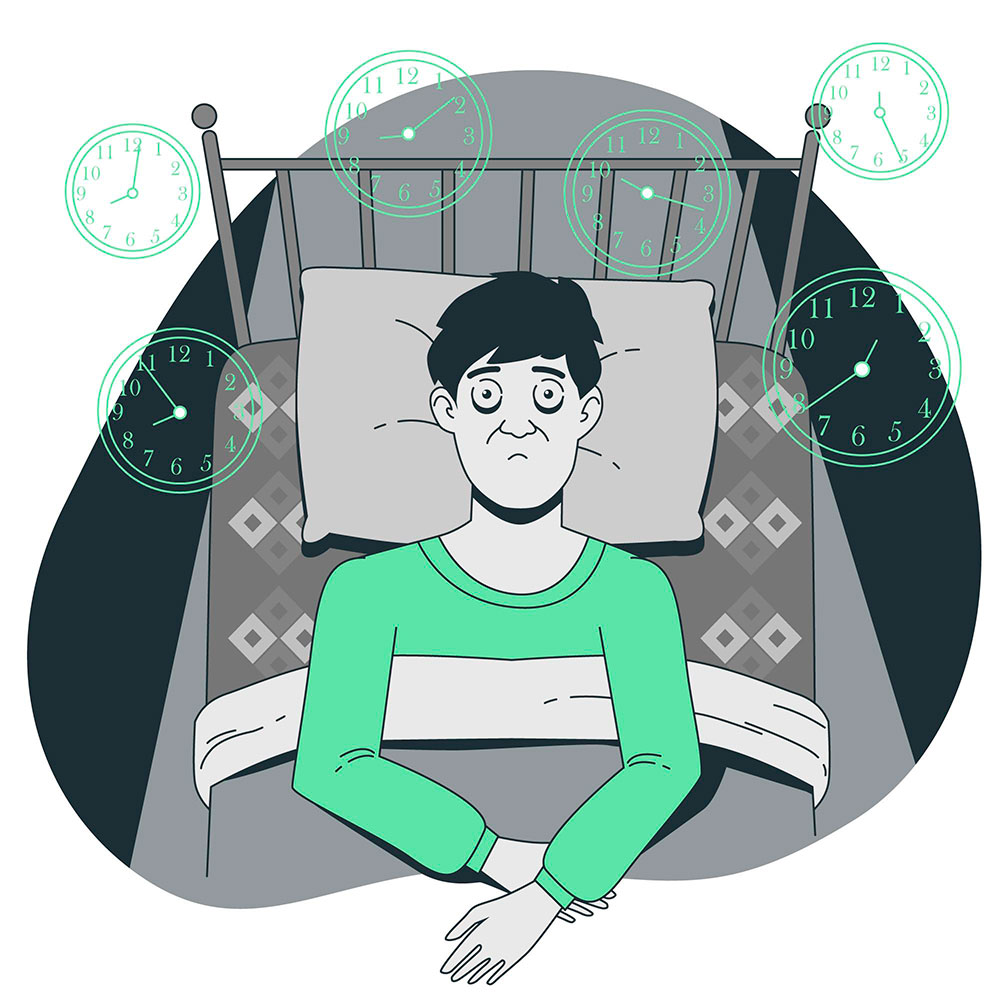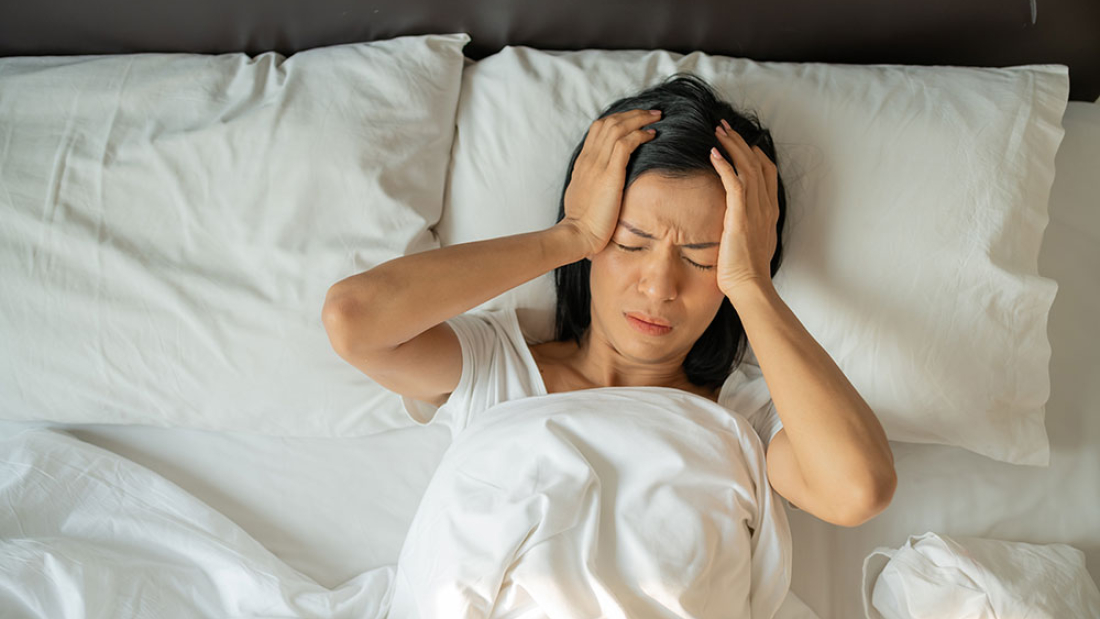Lack of sleep can have a profound impact on mental health, influencing various aspects of emotional well-being, cognitive function, and overall psychological resilience. In today’s fast-paced and demanding world, many individuals experience insufficient sleep, leading to a range of mental health challenges. This introduction explores the relationship between sleep deprivation and mental health, shedding light on the ways in which inadequate sleep can affect our mental well-being.
The importance of sleep for mental health cannot be overstated. Sleep serves as a critical period of rest and rejuvenation for both the body and the mind. During sleep, the brain undergoes essential processes such as memory consolidation, emotional regulation, and neural restoration. When we consistently lack adequate sleep, these processes are disrupted, potentially leading to negative consequences for our mental health.
One of the primary ways in which lack of sleep affects mental health is through its impact on mood regulation. Sleep deprivation can lead to increased irritability, emotional instability, and a heightened vulnerability to stress. These emotional challenges can contribute to the development or exacerbation of mood disorders such as depression and anxiety. In fact, studies have shown that individuals with chronic insomnia have a significantly higher risk of developing these mental health conditions.
Cognitive function is also greatly influenced by sleep. Lack of sleep can impair attention, concentration, problem-solving abilities, and decision-making skills. It becomes increasingly difficult to focus on tasks, process information efficiently, and retain new knowledge. This cognitive impairment can affect academic and professional performance, as well as overall productivity and quality of life.
Furthermore, sleep deprivation can heighten the risk of developing psychiatric disorders. Chronic sleep problems have been linked to an increased vulnerability to conditions such as bipolar disorder, schizophrenia, and attention-deficit/hyperactivity disorder (ADHD). These disorders can be challenging to manage on their own, and the presence of sleep disturbances can further complicate treatment and recovery.
How Does Lack of Sleep Affect Mental Health?
Lack of sleep can have a significant impact on mental health and well-being. Here are some ways in which insufficient sleep can affect mental health:
- Mood disorders: Sleep deprivation can contribute to the development or exacerbation of mood disorders such as depression and anxiety. It can make existing symptoms worse and increase the risk of developing these conditions.
- Increased risk of psychiatric disorders: Chronic sleep deprivation has been associated with an increased risk of developing psychiatric disorders such as bipolar disorder, schizophrenia, and attention-deficit/hyperactivity disorder (ADHD).
- Cognitive impairment: Lack of sleep can impair cognitive function, including difficulties with concentration, attention, problem-solving, and memory. This can affect academic or work performance and lead to increased frustration and irritability.
- Emotional instability: Sleep deprivation can make individuals more prone to emotional instability, mood swings, irritability, and decreased emotional regulation. It may also contribute to a negative outlook on life and reduced ability to cope with stress.
- Impaired decision-making: Sleep-deprived individuals may experience difficulties in making sound judgments, assessing risks accurately, and making rational decisions. This can impact various aspects of life, including relationships, work, and personal well-being.
- Increased susceptibility to stress: Lack of sleep can make individuals more vulnerable to stress and reduce their ability to cope effectively. It can amplify the perceived stress levels and hinder the ability to manage stressful situations.
- Decreased overall well-being: Chronic sleep deprivation can significantly impact overall well-being and quality of life. It can lead to decreased energy, motivation, and enjoyment of activities, further exacerbating feelings of distress and dissatisfaction.
It’s important to note that the relationship between sleep and mental health is complex and often bidirectional. While lack of sleep can negatively impact mental health, mental health issues can also disrupt sleep patterns and contribute to insomnia or other sleep disorders. Therefore, addressing both sleep problems and mental health concerns is crucial for overall well-being.
If you are experiencing persistent sleep difficulties or have concerns about your mental health, it is advisable to consult with a healthcare professional or mental health provider. They can help assess your situation, provide appropriate guidance, and recommend treatments or interventions to support both your sleep and mental health.
Can Insomnia Be Caused by Depression?
Yes, insomnia can be caused by depression, and the relationship between the two is often bidirectional. Depression and insomnia commonly coexist and can influence each other in several ways:
- Insomnia as a symptom of depression: Difficulty falling asleep, staying asleep, or experiencing non-restorative sleep can be symptoms of depression. Individuals with depression may have racing thoughts, excessive worry, or feelings of sadness that make it challenging to relax and fall asleep.
- Insomnia as a risk factor for depression: Chronic insomnia or persistent sleep difficulties can increase the risk of developing depression. Sleep deprivation affects mood regulation and can contribute to the onset or worsening of depressive symptoms.
- Maintenance of depression symptoms: Insomnia can also contribute to the maintenance of depressive symptoms. Sleep disruption can worsen mood, decrease energy levels, impair cognitive function, and reduce motivation to engage in activities that promote well-being.
- Reduced treatment response: Insomnia can impact the effectiveness of treatment for depression. Sleep disturbances may make it more challenging to respond to antidepressant medications or psychotherapy, highlighting the importance of addressing both sleep and depression concurrently for better outcomes.
It’s important to note that not all individuals with depression will experience insomnia, and not all individuals with insomnia will develop depression. However, the connection between the two conditions is well-established, and effectively managing both sleep and depression is crucial for overall well-being.
If you are experiencing symptoms of depression or persistent insomnia, it’s advisable to seek professional help from a healthcare provider or mental health professional. They can conduct a thorough evaluation, provide an accurate diagnosis, and recommend appropriate treatment options to address both conditions.

How Long Does Depression Insomnia Last?
The duration of depression-related insomnia can vary from person to person. In some cases, insomnia may occur during an episode of depression and resolve once the depressive episode is treated or subsides. In other instances, insomnia may persist beyond the duration of the depressive episode and become a chronic issue.
The length of time that depression-related insomnia lasts can be influenced by several factors, including:
- Treatment: Timely and effective treatment of depression can help alleviate insomnia symptoms. If depression is adequately addressed through medication, therapy, or other interventions, it can lead to an improvement in sleep patterns.
- Co-occurring factors: Other factors, such as stress, anxiety, or medical conditions, can contribute to insomnia alongside depression. Addressing these additional factors and developing strategies to manage them can help in resolving insomnia symptoms.
- Sleep hygiene and habits: Adopting good sleep hygiene practices, such as maintaining a consistent sleep schedule, creating a sleep-friendly environment, and practicing relaxation techniques, can contribute to improved sleep even during periods of depression.
- Individual differences: Every person is unique, and the duration of insomnia can vary based on individual circumstances, severity of depression, personal resilience, and response to treatment.
It is important to remember that everyone’s journey with depression and insomnia is different. If you are experiencing depression-related insomnia, it is advisable to seek help from a healthcare provider or mental health professional. They can provide a comprehensive evaluation, diagnose the underlying conditions, and guide you through appropriate treatment options. With proper care and support, it is possible to manage and alleviate insomnia symptoms associated with depression.
How Do I Deal with Depression and Insomnia?
Dealing with depression and insomnia can be challenging, but there are strategies and approaches that can help. Here are some suggestions:
- Seek professional help: Reach out to a healthcare provider or mental health professional for a comprehensive evaluation and appropriate treatment. They can help you understand the underlying causes of your depression and insomnia and guide you through effective interventions, which may include therapy, medication, or a combination of both.
- Establish a sleep routine: Establishing a consistent sleep routine can help regulate your body’s internal clock and promote better sleep. Go to bed and wake up at the same time each day, even on weekends. Create a relaxing pre-sleep routine to signal to your body that it’s time to wind down.
- Practice good sleep hygiene: Adopt healthy sleep habits to create a conducive sleep environment. Ensure your bedroom is cool, dark, and quiet. Avoid stimulating activities before bed and limit exposure to electronic devices that emit blue light. Use your bed primarily for sleep and intimacy.
- Manage stress: Stress can exacerbate both depression and insomnia. Engage in stress-reducing activities such as mindfulness meditation, deep breathing exercises, or engaging in hobbies you enjoy. Explore stress management techniques that work best for you.
- Regular exercise: Engaging in regular physical activity has been shown to have positive effects on both mental health and sleep quality. Aim for at least 30 minutes of moderate exercise most days of the week. However, avoid vigorous exercise close to bedtime, as it may be too stimulating.
- Cognitive-behavioral therapy for insomnia (CBT-I): CBT-I is a specific form of therapy that targets insomnia. It focuses on identifying and changing negative thoughts and behaviors related to sleep. CBT-I can help improve sleep habits, regulate sleep patterns, and reduce anxiety about sleep.
- Avoid alcohol and caffeine: Both alcohol and caffeine can interfere with sleep quality. Limit or avoid their consumption, especially in the evening and close to bedtime.
- Create a support network: Reach out to supportive friends, family members, or support groups. Sharing your experiences and feelings with others who understand can provide comfort and assistance in managing depression and insomnia.
- Take care of yourself: Practice self-care and prioritize activities that promote well-being. Engage in activities you enjoy, practice relaxation techniques, and ensure you are meeting your basic needs for nutrition, hydration, and self-care.

Remember, finding the right approach may require time and patience. It’s essential to work closely with healthcare professionals to develop a personalized treatment plan that addresses both depression and insomnia. By combining professional guidance, self-care, and healthy habits, you can improve your overall well-being and increase the chances of better sleep and reduced depressive symptoms.
In conclusion, insomnia and sleep are intricately connected, with insomnia being a common sleep disorder that can significantly impact overall well-being. Insomnia disrupts sleep patterns, leading to difficulties in falling asleep, staying asleep, or achieving restorative sleep. It can arise from various factors such as stress, anxiety, lifestyle habits, or underlying medical conditions. Addressing insomnia is crucial for improving sleep quality, mental health, and daily functioning. Implementing strategies like establishing a consistent sleep routine, practicing good sleep hygiene, managing stress, and seeking professional help can effectively manage insomnia. By prioritizing sleep and adopting appropriate interventions, individuals can enhance their overall health and well-being.
Brought to you by Fomat Medical

